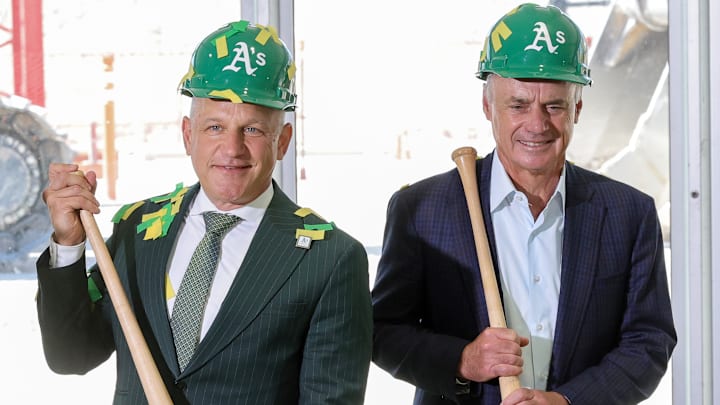The future of MLB's media rights has been up in the air for years now, ever since the burst of the regional television and cable bubbles left several teams underwater and every sports league desperate for answers. ESPN opting out of its current deal, one that gave it both Sunday Night Baseball and Wild Card Series games, made things even murkier.
The good news is that Thursday finally provided us a bit of clarity on what the future of baseball broadcasts might look like. The bad news is that said future sure seems to put lining MLB's pockets ahead of allowing fans to actually access the sport — in other words, the future of commissioner Rob Manfred's dreams.
According to a report from Andrew Marchand of The Athletic, ESPN and MLB "have a framework agreement" that would put the Worldwide Leader back in the baseball business and then some. No longer would ESPN carry Sunday Night Baseball; instead, the network would get 30 games on a different day of the week, many of which it would air exclusively. The real kicker, though, is in the fine print.
Per Marchand, ESPN is assuming "full rights to in- and out-of-market games" of the five teams for which MLB is currently handling broadcast responsibilities: the Cleveland Guardians, San Diego Padres, Minnesota Twins, Arizona Diamondbacks and Colorado Rockies. But there's a catch: Not only would fans in those markets need to pay for a subscription to ESPN, either directly or through a cable provider, but they'd need to then also pay an added price to receive their local team's games.
And, somehow, that's not even the worst part. Under this agreement, ESPN would also acquire the MLB.tv service, streaming every out-of-market game around the league. And here, too, fans would be forced to pay through the nose: "For digital consumers," Marchand writes, "fans are likely to need an ESPN direct-to-consumer subscription to go along with MLB.TV." Yes, seriously: If you're not in your favorite team's market, or you just want to watch more games than what's available locally, or you happen to root for a team without its own local TV deal, prepare to pay twice for the privilege of watching baseball.
Then again, making as much money as possible no matter what it does to the actual product is the running theme of the Manfred era.
For more news and rumors, check out MLB Insider Robert Murray’s work on The Baseball Insiders podcast, subscribe to The Moonshot, our weekly MLB newsletter, and join the discord to get the inside scoop during the MLB season.
MLB's new TV rights deal spits in the face of the sport's most loyal fans
We see it time and time again: Manfred doesn't really care whether people like baseball, or whether the people do like it can watch it easily, so long as it's making more money for MLB as soon as possible. The Home Run Derby? Stick that thing on Netflix, just for the hell of it. Games at different venues? Sure, even if they're manifestly unfit to hold a baseball game. National broadcast packages? Divide them up so that fans need several subscriptions just to watch all of their team's games, never mind anyone else's.
Manfred doesn't work for fans, or for baseball as an institution. He works for the 30 big-league owners, and his only real operating impulse is to enrich their investment as much as humanly possible. He's willing to bet that current MLB.tv subscribers are committed enough to the sport and their teams that they'll pay even more for the privilege, and he'll gouge them just because he can — not because this will make it easier for those not already in the tribe to be exposed to the sport.
Which is going to come home to roost at some point. Sure, it'll help the bottom line in the short-term, but all owners are going to do with that money is sit on it and then turn around and demand a salary cap anyway. The normal people who make MLB's net worth what it is, meanwhile, will have to jump through even more hoops, and larger audiences who might broaden baseball's appeal still aren't being reached in a compelling way. Those paychecks are nice for now, but eventually they're going to dry up if the league can't maintain and expand its popularity; that's a task Manfred couldn't have less interest in.
